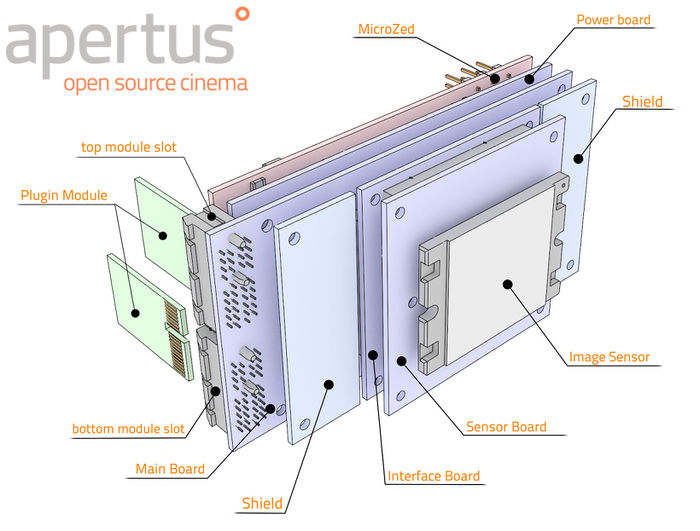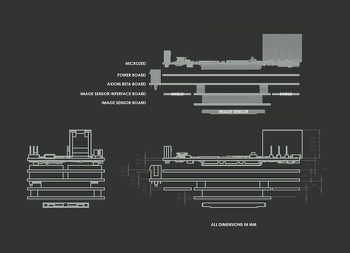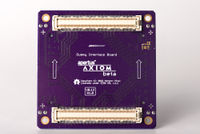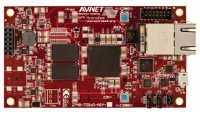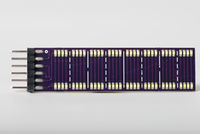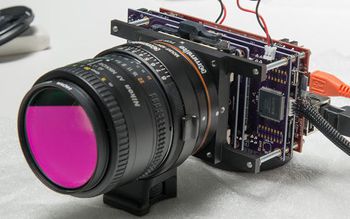Difference between revisions of "AXIOM Beta/Camera Structure"
| Line 53: | Line 53: | ||
|- | |- | ||
! scope=row style="text-align: left;" | AXIOM Beta Skeleton Enclosure | ! scope=row style="text-align: left;" | AXIOM Beta Skeleton Enclosure | ||
| 65.1mm || 111.76mm || | | 65.1mm || 111.76mm || 9mm || 47.9g | ||
|- | |- | ||
! scope=row style="text-align: left;" | Enclosure Footplate | ! scope=row style="text-align: left;" | Enclosure Footplate | ||
Revision as of 10:30, 20 November 2017
1 Camera Structure
“The hardware design of the AXIOM Beta was kept simple at first, purely addressing problems discovered with the AXIOM Alpha. In the beginning we had intended to design the camera around a single board on top of an off-the-shelf FPGA/system-on-chip development board: the MicroZed™, but as a result of field testing and together with feedback gathered from the community we agreed to make it far more powerful by devising a more complex stack of boards where each layer is dedicated to specific functions.” - Sebastian Pichelhofer.
2 AXIOM Beta PCB Stack Layout
Version 4:
Note: All dimensions are not final. Work in progress...
File:PCB Stack Concept V03 02.pdf
Onshape CAD workfile here
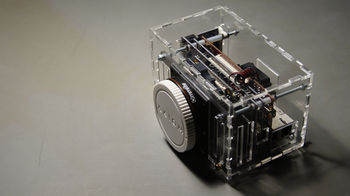
3 Skeleton and Enclosure
The AXIOM beta Skeleton Enclosure consists of three components; Footplate, Skeleton and E-Mount lens tube.
The camera's PCB stack should ideally be affixed to something solid for robustness, particularly where the weight of a lens has the potential to pull on the pins connecting the camera's sensor board to the rest of the stack. These components are typically milled from aluminium - see approximate cost for supply in AXIOM_Beta/Prices. If you're equipped to mill a skeleton for yourself or you'd like to modify the standard in some way then the CAD file is linked below.
>>>> TODO include picture.
Skeleton and Skeleton Footplate: https://github.com/apertus-open-source-cinema/beta-hardware/tree/master/Enclosure/Skeleton_E-mount
Onshape PCB Stack and Skeleton Assembly: https://cad.onshape.com/documents/58bd498285673a104722aacd/w/466b8105bf6807b3f4f50b6c/e/b33cc7b3cc3cc5eebd5c2ae6
More enclosure options will follow but there are two versions currently available.
For enclosures (development pending) see - AXIOM_Beta/Enclosures
4 Dimensions
| Height | Width | Length | Weight | |
|---|---|---|---|---|
| AXIOM Beta Skeleton Enclosure | 65.1mm | 111.76mm | 9mm | 47.9g |
| Enclosure Footplate | 45mm | 30mm | 8mm | 27.9g |
| E-mount Lens Tube | NA | TODO | NA | 28g |
| AXIOM Beta I: Developer Kit (board stack, footplate, lens tube & skeleton enclosure) | 65.1mm | 111.76mm | 74mm | 319g |
| AXIOM Beta II: Production Ready Enclosure | TBD | TBD | TBD | TBD |
5 Specifications
| AXIOM Beta Planned Technical Specifications | |
|---|---|
| Image Sensor | 3 different swappable sensor modules planned |
| Modules and Shields | Single HDMI Full HD (4:4:4) output at up to 60 FPS |
| Dual 6G SDI output (single input) | |
| 3x PMOD debug module | |
| LED matrix debug module | |
| Genlock, Trigger, Timecode, LANC shields (in development) | |
| 4K Displayport/HDMI (in development) | |
| Features | 4K RAW experimental HDMI/Displayport outputs over 1080p60 |
| Remote Control | Change/access all camera functions from smartphone , tablet, laptop (Web GUI, Serial console, SSH) and AXIOM Remote |
| Power Management | Voltage, current, temperatures |
| Wide input voltage range (5-40V - Presently camera only allows 5V) | |
| Motion Tracking | 3D Accelerometer, 3D magnetometer and 3D gyroscope e.g. for image stabilization |
| Swappable Lens Mounts | Passive E-mount plus adapters for: Passive Nikon F-Mount; passive Canon EF Mount |
| Operating System | Embedded Linux (Arch Linux) |
| Hardware Architecture | Xilinx Zynq 7020 based MicroZed |
| Image Processing | Look-Up-Tables (LUTs), matrix color conversion, Fixed Pattern Noise (FPN) compensation, false color display, overlays, dead pixel compensation |
Note: As the AXIOM Beta is currently under heavy development the above table describes goals not the current state of development.
6 Main PCBs in Detail
The AXIOM Beta comprises five printed circuit boards (PCBs)
In rare cases users may want to build the camera and or its components themselves - see AXIOM_Beta/Prices for cost estimates. We can either supply all the individual components or the relevant files with a view to a user sourcing unpopulated PCBs directly from the manufacturer. In any event make contact and we'll provide guidance.
Note: Designing V2 of AXIOM Beta PCBs began in September 2017. Existing camera owners will be sent the updated, improved boards free of charge. The method behind PCB redesign is about extending camera features with more sophisticated chips.
| AXIOM Beta PCB's | ||
|---|---|---|
| Sensor Board | The Beta CMV12K ZIF Sensor Board hosts the heart of every cinema camera - the (CMOS) image sensor. apertus° offered three different sensor options during the crowd funding campaign; Super35, Super16 and 4/3rds, and as almost 90% of the backers opted for the Super35 sensor its respective module was developed first. The camera uses the ams Sensors Belgium CMV12000. Note: The ZIF (Zero insertion force) socket is useful for developers as it allows for the sensors removal at the turn of a lever (zero force). The AXIOM Beta II: Production Ready camera hosts the Beta CMV12K THT Sensor Board. THT (Through hole tech) is suited to applications where the sensor-front-end won't be removed regularly. As such the THT Sensor Board requires that care is taken not to bend the sensor pins on insertion. | |
| Interface Board | The Beta Interface Dummy Board acts as a bridge between the image sensor board and the rest of the camera. It converts communication between the aforementioned components to a standard protocol so that almost any image sensor that becomes available in the future can be used with the AXIOM Beta without changing the rest of the hardware. If AXIOM users felt that 8K was in demand they would simply swap the sensor board for one capable of capturing images in the desired resolution. | |
| Beta Main Board | The Beta Main Board is the equivalent of a PC's motherboard. It hosts two external medium-speed shield connectors and two high-speed plugin module slot connectors. These act as a central switch for defining where data captured by the sensor and other interfaces gets routed to inside the hardware. In this regard, all specifics can be dynamically reconfigured in software opening up a lot of new possibilities such as adding shields for audio recording, genlock, timecode, remote control protocols or integrating new codecs and image processing inside the FPGA. In the centre of the main board a 'solder-on' area has been incorporated, this will for example host chips capable of sensing the camera's orientation and acceleration (the same chips used to stabilise quadcopters and track head movements in VR headsets). Being situated directly behind the image sensor centre means that these sensors are ideally positioned to supply data for image stabilisation or metadata about the camera’s orientation and movement during a shot. | |
| Beta Power Board |
Finally, the Beta Power Board PCB, the last board in the stack before the MicroZed™, generates all the different supply voltages for the chips and logic on the other PCB’s inside the camera. It also monitors currents so that it can estimate remaining power based on the recorded consumption. In the current revision of the camera a predefined set of supply voltages matching the current application with the rest of the camera have been generated, in the future however, it will be possible for users to dynamically reconfigure voltages according to their needs through the camera’s software. | |
| MicroZed |
The AES-Z7MB-7Z020-SOM-G MicroZed™ is a development board based on the Xilinx Zynq®-7000 All Programmable SoC (System-on-a-Chip). It can be used as both a stand-alone development board for SoC experimentation or in a product like the AXIOM Beta. | |
7 Plugin Modules and Shields
The AXIOM Beta has two high speed module slots with PCIe connectors (these are not really PCIe cards, we just utilize PCIe for the connectors). Each module has a total bandwidth to/from the main processing FPGA of at least 6 Gbit/s. This makes the modules perfect for dealing with high bandwidth video outputs like HDMI/Displayport/SDI.
Due to the flexibility that this arrangement provides this could also allow us to create a dedicated solid-state media recorder module in the future. For now the AXIOM Beta relies on external recording though.
The name shields was inspired by the Arduino plugin boards that are also called "shields". AXIOM Beta sports two shield slots with space for connectors going to both sides of the camera. In contrast to modules the shields in the Beta have slow and medium speed interfaces to the main processing FPGA, and, therefore, are perfect for tasks like: trigger IN/OUT, genlock IN/OUT, timecode IN/OUT, sync IN/OUT or connecting external sensors or buttons, LCDs, etc.
The AXIOM Beta has 2 medium speed IO interfaces to be used in conjunction with "shields".
- One 200Mbit/s shield interface.
- One 1Gbit/s shield interface.
Note: Shields are not hot plug-able.
There are 2 high speed IO interfaces where "plugin modules" can be hot plugged.
- 6.2Gbit/s each:
- 6 ✕ 950Mbit/s
- 500MBit/s GPIO
- Two modules can be combined in one 12.4 Gbit/s double height module.
- Hot pluggable.
- 2x PCIe connectors (not using PCIe signaling)
| AXIOM Beta Plugin Modules and Shields | ||
|---|---|---|
| HDMI Plugin Module | The Beta HDMI Plugin Module The 1080p60 4:4:4 output HDMI module is finished, the AXIOM Beta can accommodate up to two of these plugin modules and supply them with independent video streams. | |
| 1x USB 3.0 Plugin Module (1x slot) | USB 3.0 interface to allow storing of 4K uncompressed video to a connected PC. Offers 3.2 Gbit/s throughput which corresponds to 400MByte/s, enough to record uncompressed 4096x2160 raw 12 bit video at 25 FPS to a connected computer. | |
| Power Adapter | The Beta Power Adapter Board ... | |
| Debug Shield | The Beta Debug Shield 2x10 GPIO banks as LED indicators plus two power LEDs. 4 LVDS pairs routed to external connectors JP1/JP2 (plus one GND). | |
| 1x PMOD Plugin Module |
The Beta 1x PMOD Plugin Module Single PMOD debug inputs/outputs for connecting a wide range of external PMOD devices - mainly intended for development and testing when General Purpose Input/Output (GPIO) is required. | |
| 3x PMOD Plugin Module |
The Beta 3x PMOD Plugin Module Triple PMOD debug inputs/outputs for connecting a wide range of external PMOD devices - mainly intended for development and testing when General Purpose Input/Output (GPIO) is required. | |
| PMOD LED Matrix Debug Module |
The PMOD LED Matrix Debug Module ... | |
| 4K HDMI Plugin Module | File:... ... |
The 4K HDMI Plugin Module Allows recording 4K/UHD video on an external recorder with a standard 2160p signal. Will also work to supply 4K/UHD screens with a signal of course. |
| SDI Plugin Module (1x slot) | File:... ... |
The SDI Plugin Module An industry standard serial digital interface (SDI) connection plugin module will provide a nominal data transfer rate of 3G/6G. |
Note: If no image or page exists in the above listings it's because the respective PCB is in development.
8 Functions
Recording Options
The AXIOM Beta currently utilizes external third-party recorders for capturing moving images. A number of different products from different brands can record the HDMI signal from the AXIOM Beta and store the video in Prores or DNxHD. There are plans for enabling AXIOM Beta internal recording to solid state storage in the future however. In particular this is a requirement for writing high speed video as the Beta sensor is capable of capturing moving images at up to 300 FPS in full 4K resolution.
Operating System
Since the camera is running Linux, you have a full operating system at your disposal. This means any 3rd party peripherals like USB drives or wireless adapters should work out of the box. Standard protocols like SSH/FTP/SCP/etc. as well as Graphical User Interfaces via HTTP can be used to interface with the camera from computers and most mobile devices.
Sound
AXIOM Beta is not capable of recording sound internally at the moment.
